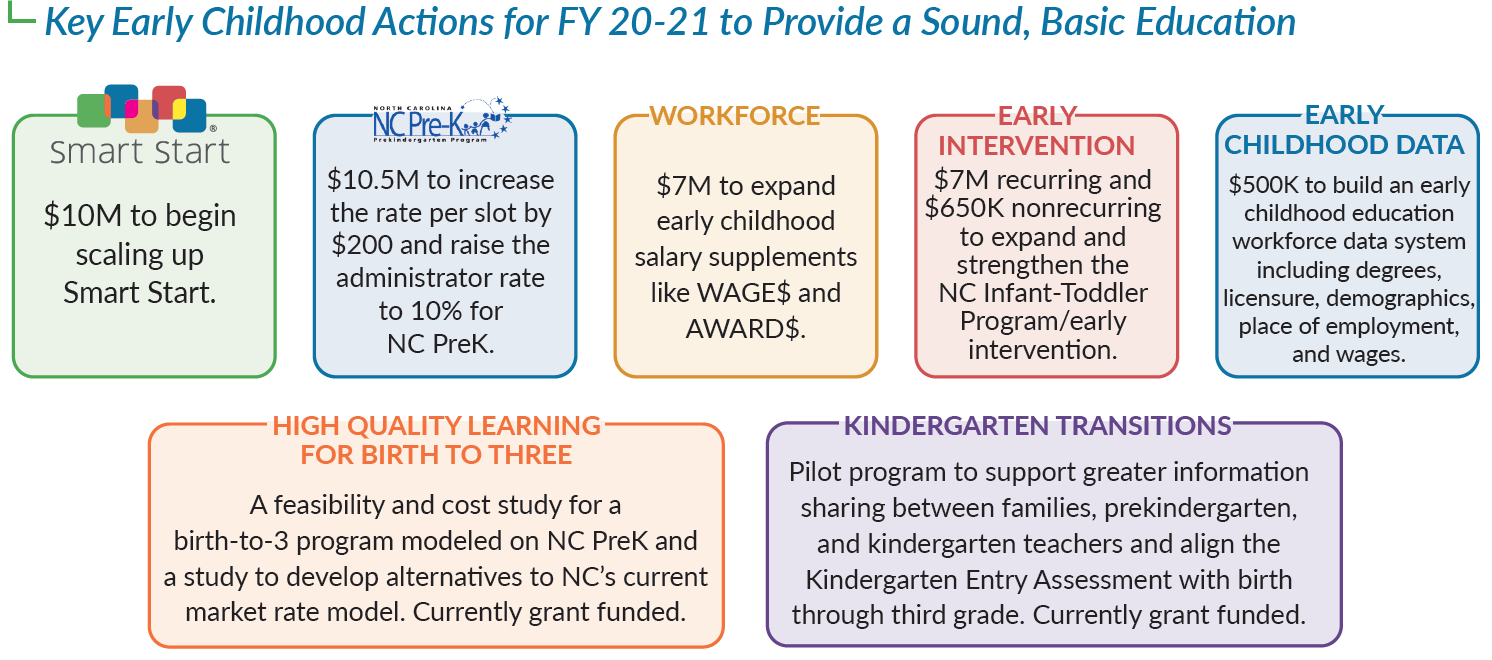Leandro - A Sound, Basic Education Begins at Birth
Leandro v. North Carolina is a lawsuit filed in 1994 by five low-wealth school districts who claimed the state was not providing children with the same educational opportunities as students in higher-income districts. In 1997, the NC Supreme Court ruled that the state's students have a constitutional right to a "sound, basic education." This constitutional right has been and continues to be denied to many North Carolina children.
The courts subsequently ruled that to meet its constitutional duty, the state must:
- Staff each classroom with a competent, well-trained teacher
- Staff each school with a competent, well-trained principal
- Identify the resources necessary, including access to early education, to ensure that all children, including those at-risk, have an equal opportunity to obtain a sound, basic education.
- These resources include access to early education
The suit has continued over time, with the Superior Court regularly reviewing state efforts to comply with the constitutional requirements. In 2017, the parties agreed to work toward a resolution in the case, which included hiring a consultant, WestEd, to develop recommendations to achieve compliance, and Gov. Roy Cooper additionally created a Commission on Access to a Sound Basic Education to assist in creating a plan for the state to meet the Leandro requirements.
In June 2020, the parties filed their first action plan outlining actions for FY 20-21 for North Carolina to meet its obligation to provide a sound, basic education.

Why It Matters
State Legislators
For current legislators, Leandro is likely to be one of the biggest issues considered at the General Assembly in the 2020 short session. Orders from the court could push the legislature to make new investments in K12 and early childhood, with implications for the rest of the state budget.
State Legislative Candidates
This year's elections will affect how the court's orders in the case will be implemented in future legislative sessions. The outcomes of these races will influence the level of political support for investments and policy change at the General Assembly, which will determine the scope of the state's response to the case. Incumbents and challengers alike should be aware of Leandro and able to express how they would fulfill the state's obligations to provide a sound, basic education.
City and Government Officials
A robust state response to the Leandro case will bring new resources into communities across the state to support early childhood and K12 education. These systems are a type of infrastructure that produces return on investment by improving economic success and quality of life while reducing costs for health, social services, and other public programs.
School Boards and K12 Systems
Aligning the K12 and early childhood systems is an important component of the Leandro case. The early childhood community and the school system must be closely aligned to ensure that young children are prepared to enter K-12 settings and continue to develop and learn successfully in the early grades.
Business Leaders, Chambers of Commerce, and Civic Groups
Leandro presents an opportunity to strengthen the entire education system, beginning at birth. A great early childhood and K12 system can help communities recuirt and retain businesses and employees, prepare the next generation to be successful in work and life, and improve long-term outcomes in education, health, and quality of life.
Faith-Based and Community Organizations
Leandro holds that all children deserve a sound, basic education that begins at birth, regardless of poverty or other disadvantage. That education must be rooted in strong communities and families, and new investments in the early childhood system would help expand access to programs that support parents in providing nurturing home environments for their children.
Click here to download an overview of Leandro vs. North Carolina to share with others.